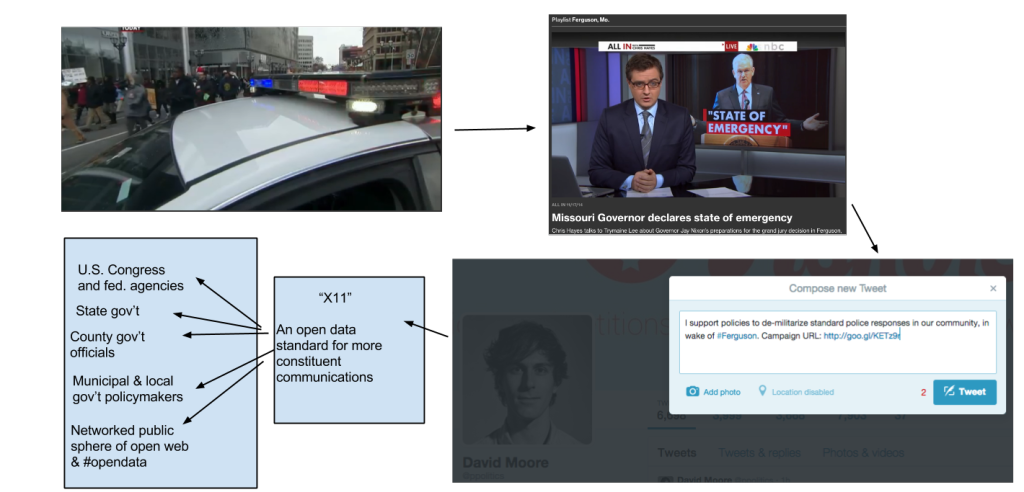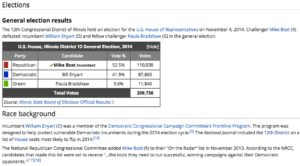Background: three federal reform election initiatives, towards mitigating the lobbying & political influence of the NRA on firearms policy.
This post seeks to touch on how social media isn’t affecting the Senate on gun control, and how open data standards for constituent communications could enable deeper organizing.
In short: members of Congress won’t enact gun control legislation because of three factors:
- NRA lobbying & campaign donations
- Limitations from intra-party leadership
- Lack of competitive primaries in approx. 95% of Congressional districts.
There are two electoral points of leverage to change this status quo (and many powerful non-electoral ones, but for now focusing on federal elections):
- Convincing more primary candidates to challenge incumbents
- Changing the calculus for the U.S. representative on the next election by making it overwhelmingly risky to maintain an unpopular position
Much commercial social media and campaign organizing tech seeks to accumulate data on public actions – signing petitions, sharing Facebook posts – while keeping most of it in proprietary silos. There are over 14 commercial projects for voting “aye/nay” on bills in Congress, hundreds of thousands of e-petition signatures from email blasts and Facebook posts and tweets and Snapchat videos, but no open data standard to view public opinion across all of them. “Civic features” in development are currently only working for the commercial app themselves, not more widely for public knowledge – but they could, if we engineer them and set the public-benefit, corporate-responsibility expectation in the #civictech community. The advocacy non-profit tech community over the past fifteen years simply didn’t design to support open data standards, in the face of legacy system pushback and huge VC investment in closed startups.
So consider a sample competitive 2014 House district, IL-12, on Ballotpedia, one of around 26-29 districts (approx. 6% of 435 total) competitive that cycle (background). Each candidate ran unopposed in primary, the incumbent D lost by approx. 20k votes in the general. There are 713k people in that district, of which maybe (ballparking here, not researched) 350k are registered voters, 300k had cast a ballot in past three federal elections? (Not trying to speculate wildly in this fast blog post, just looking for ballparks, precise numbers welcome from tough-to-use Census.gov.)
Among 350,000 registered voters in-district, the knowledge of how many supporters of gun control measures there are is split between different entities: state and county political parties (in voter rolls and turnout targeting and demographic and consumer info); local groups and organizers, using campaign tools; issue groups such as MoveOn or the Tea Party, using CRM software; and companies such as Change.org, Facebook (well, sorta), Countable, NationBuilder and many more.
To impact the two points of electoral leverage above, open data standards for constituent communications would help organizers and advocates identify two needed pieces of public info.
- How many primary voters are solid supporters of gun control measures; might not be a majority, but in some districts, it could be close enough for political cover;
- How many eligible and registered voters support gun control measures, and how many are likely to turn out in Nov. 2016 elections for this issue when reached with follow-up communications. Even if only around 15,000 votes in the sample district above were needed for the incumbent D to hold his seat and support gun control, if this number is more than 25,000, that’s a significant general election signal.
In summary, in the Illinois 12th, local journalists and community groups don’t know mass data on gun control support, because it’s split between Facebook posts, Change petitions, Action Kit clicks from MoveOn emails, and issue-groups using services such as NationBuilder. Maybe together it can be found to be 125,000, more than the votes for the Republican challenger who opposes gun control. We don’t know until we have open-data infrastructure for civic engagement, including the tough problem of validating action takers as constituents in a district, and much-needed API’s for campaign contributions and election results.

Open data standards, such as our proposed “X11”, channel social media updates into open public data.
As a result of supporting open data standards such as our proposed X11 for constituent communications, social media posts could be located back to a district and a campaign webpage. Taking a stand for gun control on social media, or clicking an action link from a Southern Illinois news outlet or political blog, could prompt others to sign-on in a meaningful way in other districts – in case you don’t have any FB friends in Madison Co, IL, including Granite City and Edwardsville, or the nearby Cahokia Mounds (I’ve actually been there, ha). And in turn, more people would be incentivized to participate from day-to-day, week-to-week, and turn out for elections, if their petition signature counted on an important federal issue such as firearms controls. (Big opportunities at state & city levels, too.)
This has been our ambitious non-profit mission, open tech for responsive government and public trust in the political process. There’s very little investment in truly free & open tech for a healthier U.S. representative democracy – venture capital looks for returns in gov-tech or lead-gen, issue groups and news media no longer have budget for open standards. Let’s make public opinion more query-able and analyze-able and action-able for organizers by breaking it out into the open web. Questions & feedback welcome – support our open-data work for public priorities – DM me for more info: @ppolitics on Twttr.
